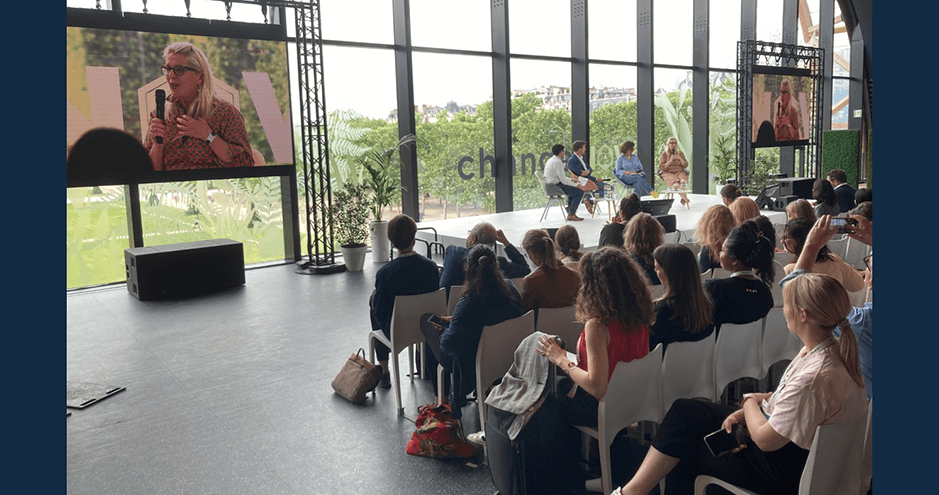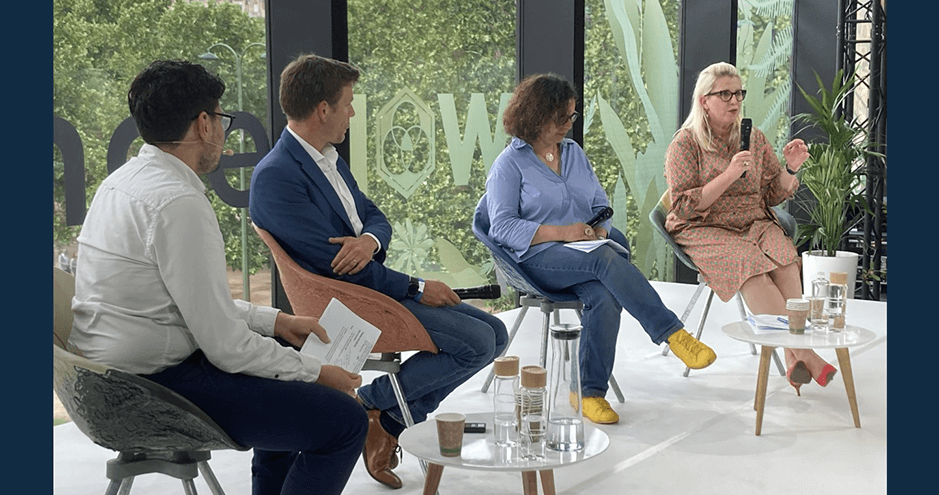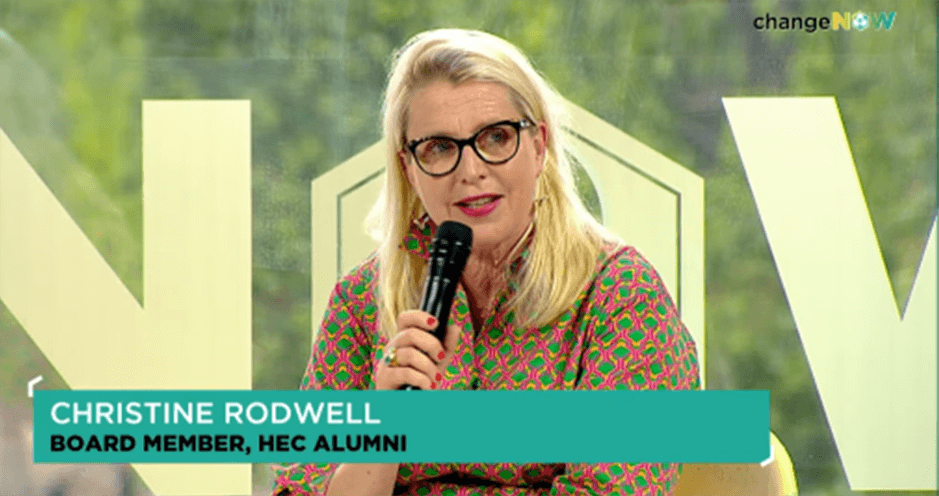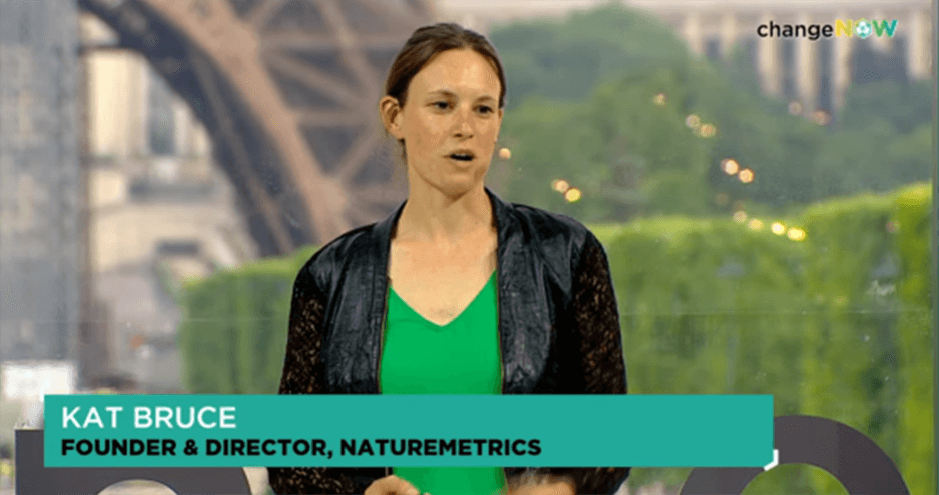Landmark HEC Paper on Biodiversity and Business Calls for “Decisive Action”
On June 7, 2022, the HEC Alumni Association officially releases its most ambitious publication yet on biodiversity and business. Led by Christine Rodwell (H.92), David Vaillant (H.98) and a team of young and passionate alumni, “Biodiversity: A Call for Decisive Action” is a clarion call to the business community and policymakers to join forces to fight one of humanity’s greatest challenges. We caught up with them at the Change Now Summit a few weeks before its release.

“This report builds on concrete insights from companies, it provides useful hints to understand this multidimensional crisis and it offers concrete recommendations,” noted the French Ambassador for the Environment Sylvie Lemmet (H.81), in the introduction to the 129-page Livre Blanc. She was one of two patrons of the study, alongside HEC Alumni President Adrien Couret (H.07). Lemmet continued: “I wholeheartedly thank the HEC Community for raising awareness on the issue of biodiversity loss among the business community. It is a clear example of how we should not be disheartened by the challenges ahead but instead be faithful to the school motto: ‘Learn to dare’”
This nine-month endeavor was the fruit of a dynamic complicity between two senior alumni and five young graduates. Julie Christiaen (H.22), Théo Maret (H.22), Adam Melki (H.21), Eliette Verdier (H.20) and Julia Girard (H.20), joined forces with Christine Rodwell, adviser to business leaders and certified Board member, and David Vaillant, executive in the financial sector, to deliver an exceptional analysis of the stakes biodiversity holds for companies both big and small. “This is an issue too often neglected!” underlines Rodwell, who advises business leaders on how to better integrate social and environmental issues into their core business strategy. “We have yet to establish strategies which explore the convergence and interdependency between climate, biodiversity and social impact.”
Biodiversity and Social Impact
David Vaillant is global head of finance, strategy and participations in a major European asset manager, and teaches sustainable finance at HEC Paris. “The report comes in a context in which HEC alumni want to increase their impact on urgent global issues and take advantage of both the school’s notoriety and its network of over 68,000 graduates. This White Paper is the fruit of 40 in-depth exchanges with leaders in business, NGOs, investors and biodiversity experts who are aware of the urgency of addressing biodiversity issues within the context of their activities.” Rodwell noted that stakes are so high even competitors have found common ground: “Take Nestlé and Danone. They’ve joined forces to address the topic of regenerative agriculture within OP2B. This initiative aligns the whole value chain, from big companies to farmers and local authorities as well as players in the financial sector and the academic world. The latter are all the more important in that their research can gauge if projects are delivering in terms of biodiversity and social impact.”
Vaillant pinpointed the importance of studying biodiversity issues in business schools such as HEC Paris. In the past year, HEC has beefed up its programs linked to sustainability – but it can go even further, says Vaillant: “The school already provides the skill set to articulate and master the vocabularies of the different worlds involved – the scientists, NGOs, lawyers, economists, innovators, environmentalists and business people. Now HEC should make sure its graduates are proficient in biodiversity topics. Not to be specialists, but to understand the stakes, explain strategies to mitigate the challenges, and integrate responses in business and government policy in a decisive and efficient way.”
Key Ethical and Societal Evolutions
The report is divided into two parts. The first half studies the current crisis based on the large scientific literature on biodiversity and its importance for both economies and societies. “Biodiversity is the very foundation of our everyday lives,” explains Rodwell. “It covers diversity within species, across species and among ecosystems. If it collapses, we see the destruction of ecosystem goods and services like crop pollination, climate regulation and oxygen production. Scientific research is showing that we are experiencing the sixth mass extinction. This translates into the disappearance of species, the decline in populations, the deterioration of functional interactions, and so forth.”
Such features have an impact on the strategies that businesses and policymakers take towards biodiversity. This is precisely at the heart of the second part of the White Paper. This builds on exchanges with the interviewees to suggest key recommendations. While there is a growing awareness of the biodiversity crisis, the report notes that it lags far behind that related to climate change. Yet, notes Vaillant, “the business community stands well placed as a stakeholder by leveraging its agility, having access to funding and understanding of production processes.” However, adds Rodwell, this capacity must be accompanied by ethical and societal evolutions for change to be effective: “Addressing the collapse of biodiversity questions the very foundations of our economies and in particular the conviction that resources are unlimited.” Both writers underline, therefore, the need to include such issues in all higher education curricula and train specialized experts to design the technical and policy changes required for this transition.
HEC Graduates Offer Solutions
This point was underlined both by other HEC graduates participating in the Change Now summit as well as guest speakers invited to the event under the imposing shadow of the Eiffel Tower. In terms of the former, several alumni were present among the 300 exhibitors from all over the world. Tristan Lecomte was at the heart of his Pur Project team which shared the climate projects designed to help companies meet their net-zero carbon emission targets. Martin Habfast, co-founder of Umiami, exhibited his latest discoveries to offer 100% meat-free products “without any compromise” on the health and well-being of health, animals and the environment. Blandine Surry, General Manager of Loop, exhibited ways her company is tackling waste by “envisioning the post-pandemic future of reusable circularity”.
Meanwhile, recently-graduated Laetitia Gombaud-Saintonge was displaying the Swen Blue Ocean investment in impact VC funding for innovations that “promote ocean health and help achieve SGD14”. She explains: “We invest in solutions with a positive impact to end overfishing, pollution and climate change. HEC helped give me this state of mind which encourages the exploration of alternative solutions and leaving our comfort zones. I’m happy the new generation of students are being exposed to more courses linked to sustainable development and tools to exploit green financing, since it’s a very rich niche!”
‘Wandering Around with a Blindfold’
Rich indeed, and all the more so in that there is an entire new field seeking innovative research tools, according to Doctor Kat Bruce, founder of Nature Metrics. The guest speaker at “Biodiversity Footprint: Measure and Act” - the same session featuring Christine Rodwell and David Vaillant - pinpointed the measurement and data problems to gauge biodiversity challenges: “We are simply not seeing the biodiversity losses. Measurement tools are too simplistic, they don’t encapsulate the complexity and messiness of the field,” the British tropical ecologist told a large public. “Take, for example, seagrass, which is vital for Carbon capture, yet we know next to nothing about its role. At Nature Metrics, we center our research on eDNA that is taken from organisms ranging from bacteria to the blue whale. But there is an urgency in accelerating the process as the world is in a biodiversity crisis and is wandering around blindfolded.”
The HEC Alumni Association White Paper seeks to pry open the blindfold with a vigorous alliance between business, public authorities and society. It reflects a dynamic trend at the business school. Recently, for example, the campus saw the fruits of an ambitious action plan that allies ecology and social transition co-constructed with all the stakeholders. “HEC must reinvent itself as we have done throughout our history,” said the Director of Ecological Transition, François Collin. The school’s transition strategy coincides with the launching of a Climate & Business certificate which “prepares students for navigating the complexities of climate change and decarbonization from a business and societal perspective.” These programs underline the multiple layers of engagement HEC has put in place to answer the threats posed by the biodiversity crisis.
Download the HEC Alumni white paper on biodiversity


